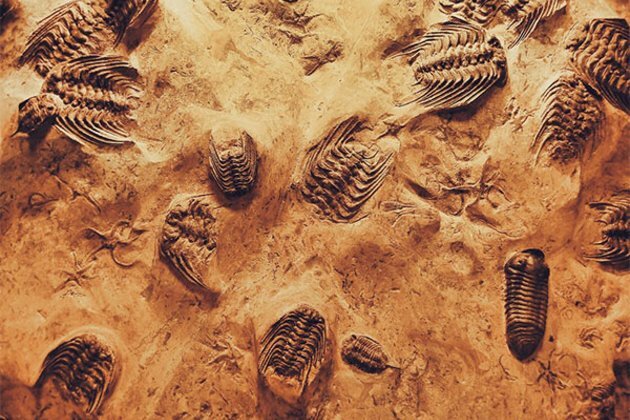Fossil site is 'Rosetta Stone' for understanding early life: Study
ANI
18 Mar 2023, 23:26 GMT+10

Edinburgh [Scotland], March 18 (ANI): A world-famous fossil hoard's secrets have been revealed by cutting-edge technology, and they could provide important hints regarding the origins of life on Earth.
Researchers believe their analysis of the 400 million-year-old hoard, which was discovered in a remote area of north-east Scotland, shows better molecular preservation of the fossils than was initially thought.
Researchers have been able to determine the chemical signatures of the many creatures present in the wonderfully preserved treasure trove from Aberdeenshire.
Just as the Rosetta Stone helped Egyptologists translate hieroglyphics, the team hopes these chemical codes can help them decipher more about the identity of the life forms, that other more ambiguous fossils represent.
The spectacular fossil ecosystem near the Aberdeenshire village of Rhynie was discovered in 1912, mineralised and encased by chert -- hard rock composed of silica. Known as the Rhynie chert, it originates from the Early Devonian period -- about 407 million years ago -- and has a significant role to play in scientists understanding of life on earth.
Researchers combined the latest non-destructive imaging with data analysis and machine learning to analyse fossils from collections held by National Museums Scotland and the Universities of Aberdeen and Oxford. Scientists from the University of Edinburgh were able to probe deeper than has previously been possible, which they say could reveal new insights about less well-preserved samples.
Employing a technique known as FTIR spectroscopy -- in which infrared light is used to collect high-resolution data -- researchers found impressive preservation of molecular information within the cells, tissues and organisms in the rock.
Since they already knew which organisms most of the fossils represented, the team was able to discover molecular fingerprints that reliably discriminate between fungi, bacteria and other groups.
These fingerprints were then used to identify some of the more mysterious members of the Rhynie ecosystem, including two specimens of an enigmatic tubular "nematophyte."These strange organisms, which are found in Devonian -- and later Silurian -- sediments have both algal and fungal characteristics and were previously hard to place in either category. The new findings indicate that they were unlikely to have been either lichens or fungi.
Dr Sean McMahon, Chancellor's Fellow from the University of Edinburgh's School of Physics and Astronomy and School of GeoSciences, said: "We have shown how a quick, non-invasive method can be used to discriminate between different lifeforms, and this opens a unique window on the diversity of early life on Earth."The team fed their data into a machine learning algorithm that was able to classify the different organisms, providing the potential for sorting other datasets from other fossil-bearing rocks.
The study, published in Nature Communications, was funded by The Royal Society, Wallonia-Brussels International and the National Council of Science and Technology of Mexico.
Dr Corentin Loron, Royal Society Newton International Fellow from the University of Edinburgh's School of Physics and Astronomy said the study shows the value of bridging palaeontology with physics and chemistry to create new insights into early life.
"Our work highlights the unique scientific importance of some of Scotland's spectacular natural heritage and provides us with a tool for studying life in trickier, more ambiguous remnants," Dr Loron said.
Dr Nick Fraser, Keeper of Natural Sciences at National Museums Scotland, believes the value of museum collections for understanding our world should never be underestimated. He said:"The continued development of analytical techniques provides new avenues to explore the past. Our new study provides one more way of peering ever deeper into the fossil record." (ANI) Share
Share
 Tweet
Tweet
 Share
Share
 Flip
Flip
 Email
Email
Watch latest videos
Subscribe and Follow
Get a daily dose of Bristol Star news through our daily email, its complimentary and keeps you fully up to date with world and business news as well.
News RELEASES
Publish news of your business, community or sports group, personnel appointments, major event and more by submitting a news release to Bristol Star.
More InformationUnited Kingdom
SectionUS sends message by publicizing visa ban on UK punk-rap band
WASHINGTON, D.C.: The Trump administration has made public a visa decision that would usually be kept private. It did this to send...
British PM faces major party revolt over welfare reforms
LONDON, U.K.: British Prime Minister Keir Starmer won a vote in Parliament this week to move ahead with changes to the country's welfare...
L'Oreal to buy Color Wow, boosts premium haircare portfolio
PARIS, France: L'Oréal is making a fresh play in the booming premium haircare segment with a new acquisition. The French beauty conglomerate...
UK lawmakers desigate protest group as terrorist organization
LONDON, UK - Lawmakers in the United Kingdom have voted overwhelmingly to proscribe the direct-action group Palestine Action as a terrorist...
Zayn Malik appears to reflect on racism faced during 'One Direction' days in new rap track
Washington [US], July 6 (ANI): British singer Zayn Malik appears to have addressed the racism he faced during his 'One Direction' days...
Lando Norris wins, Nico Hulkenberg makes history at British GP
(Photo credit: Eric Bolte-Imagn Images) McLaren's Lando Norris won his first British Grand Prix -- his home-country event -- in a...
International
SectionMoscow removes Taliban from banned list, grants official status
MOSCOW, Russia: This week, Russia became the first country to officially recognize the Taliban as the government of Afghanistan since...
Netanyahu vows 'No Hamas' in postwar Gaza amid peace talks
CAIRO, Egypt: This week, both Hamas and Israel shared their views ahead of expected peace talks about a new U.S.-backed ceasefire plan....
US sends message by publicizing visa ban on UK punk-rap band
WASHINGTON, D.C.: The Trump administration has made public a visa decision that would usually be kept private. It did this to send...
Tragedy in Spain: Diogo Jota and his brother die in car accident
MADRID, Spain: Liverpool footballer Diogo Jota and his younger brother, André Silva, have died in a car accident in Spain. Spanish...
Early heatwave grips Europe, leaving 8 dead and nations on alert
LONDON, U.K.: An unrelenting heatwave sweeping across Europe has pushed early summer temperatures to historic highs, triggering deadly...
U.S. military, China, Russia in Space race
President Donald Trump's plans to build a space-based Golden Dome missile defense shield have drawn immediate criticism from China,...












